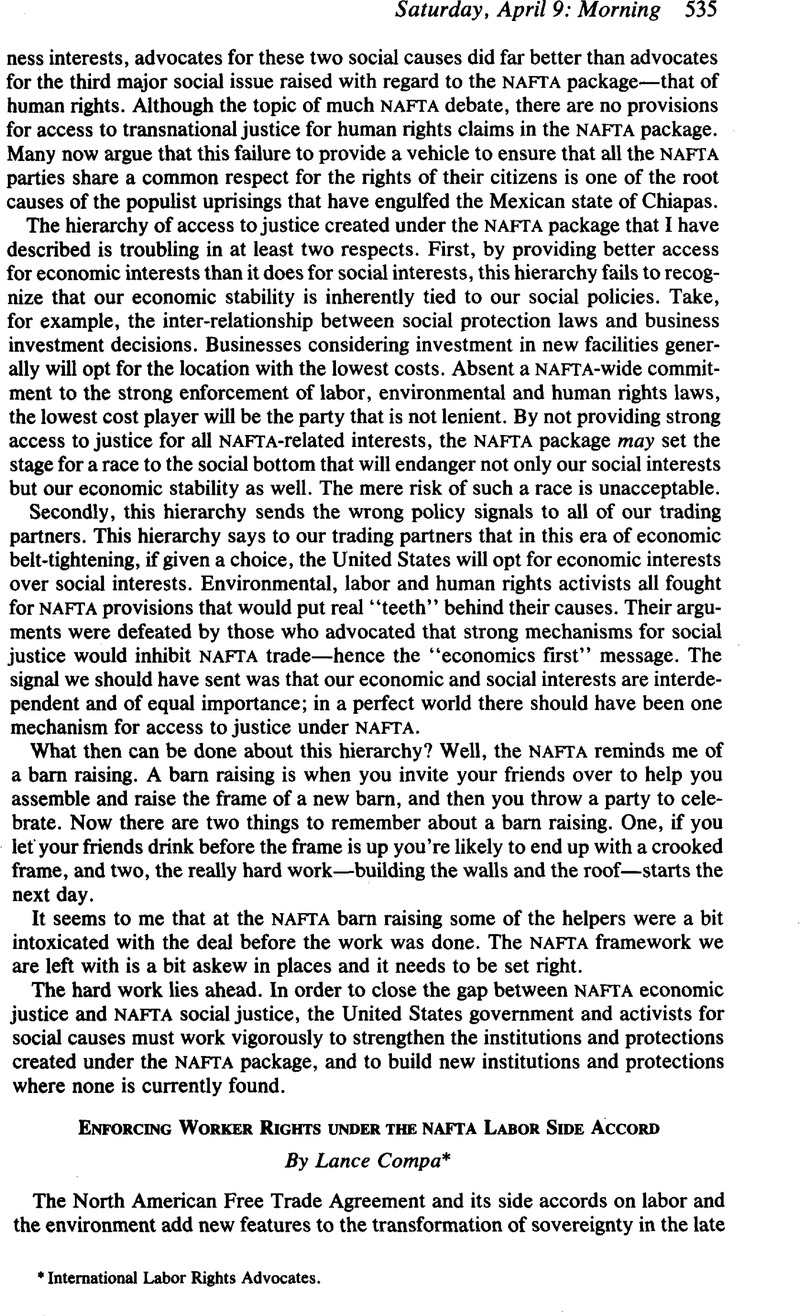Article contents
Enforcing Worker Rights under the NAFTA Labor Side Accord
Published online by Cambridge University Press: 28 February 2017
Abstract

- Type
- Access to Transnational Justice: Responding to the NAFTA
- Information
- Copyright
- Copyright © American Society of International Law 1994
References
1 See “Expanding Trade and Creating American Jobs,” Remarks by Governor Bill Clinton, North Carolina State University, Raleigh, North Carolina, October 4, 1992.
2 See Announcement of NAFTA Supplemental Agreements on Labor and the Environment, Statement by Ambassador Mickey Kantor, Office of the United States Trade Representative (August 13, 1993).
3 For accounts of labor’s organizing effort against the NAFTA, see Kilborn, Peter T., Unions Gird of War Over Trade Pact , N.Y. Times , Oct. 4, 1993, at A14 Google Scholar; Friedman, Thomas L., Adamant Unions Zero In on Clinton , N.Y. Times , Nov. 10, 1993, at BIOGoogle Scholar.
4 See LeVinson, Jerome I.. The Labor Side Accord to the North American Free Trade Agreement; An Endorsement of the Abuse of Worker Rights in Mexico , Economic Policy Institute (1993)Google Scholar. There was a subtle division among laborites on the NAFTA. Some opposed any Continental trade agreement, whatever form it took; others argued that a NAFTA with a strong "social charter" deserved support. Since such a "social charter" never appeared this incipient division never emerged. Labor remained unanimous in its opposition to the NAFTA.
5 See Schneider, Keith, Environment Groups Are Split on Support for Free-Trade Pact , N.Y. Times , Sept. 16, 1993, at Al Google Scholar.
6 The House of Representatives approved the NAFTA by a 234 to 200 vote on November 17, 1993. The Senate�conceded by anti-NAFTA forces, who concentrated their efforts on the House�approved the pact November 20, 61 to 38.
7 See NAFTA Chapter 17, Intellectual Property, arts. 1714-18.
8 See Benz v. Compania Navlera Hidalgo, S.A., 353 U.S. 138, 143-44 (1957).
9 For example, see EEOC v. Arabian Am. Oil Co., 449 U.S. 244 (1991), superseded by Section 109(a) of the Civil Rights Act of 1991, P.L. No. 102-166, 105 Stat. 1071 (1991). For a discussion of recent changes in the direction of a more internationalist treatment of labor law and related issues, see Compa, Lance, Labor Rights and Labor Standards in International Trade , 25 Law & Pol’y. In Int’l Bus. 1, 165-91 (fall 1993)Google Scholar.
10 The eleven areas defined in NAALC Article 49 are themselves divided into three categories of enforcement: (1) rights of association and organizing; (2) collective bargaining; (3) right to strike [subject to Level 1 enforcement only]; (4) forced labor; (5) nondiscrimination; (6) equal pay; (7) workers’ compensation; (8) migrant labor [subject to Level 1 and Level 2 enforcement]; (9) child labor; (10) minimum wage and hour laws; and (11) occupational safety and health [subject to enforcement Levels 1, 2 and 3].
11 See infra p. 539, for a discussion of the first such public submissions to the U.S. NAO. For the NAO’s procedures, see Revised Notice of Establishment of U.S. National Administrative Office and Procedural Guidelines, 59 Fed. Reg. 16,660 (April 7, 1994).
12 See The UE-F.A.T. Strategic Organizing Alliance: Statement on Joint Work (February 1992), available from the United Electrical, Radio & Machine Workers of America, Pittsburgh, Penn.
13 See Robert L. Rose, NAFTA Side Pact on Labor Laws Faces First Test: Unions Say GE, Honeywell Fired Mexican Workers For Trying to Organize, WALL ST. J., Feb. 15, 1994, at A7. The UE and Teamster complaints are on file with the U.S. National Administrative Office, U.S. Department of Labor.
14 On April IS, 1994, and U.S. National Administrative Office announced that it was accepting the UE and Teamsters submissions and would proceed to a public hearing on the incidents that gave rise to the complaints. See Shorrock, Tim, Labor Department To Review Charges of NAFTA Violations , J. Comm. , April 18, 1994, at 3A.Google Scholar
15 Note, however, that the NAALC does not grant subpoena power to any of the oversight and enforcement bodies. The hearings would provide a forum for witness statements and questions by NAO officials, but not examination and cross-examination by counsel.
- 1
- Cited by




